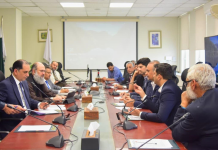DNA
ISLAMABAD: The All Pakistan Business Forum (APBF) has strongly criticized the recent gas price hike approved by the federal cabinet by 26 percent to put additional burden of at least Rs850 billion on the industry, particularly small and medium enterprises (SMEs), and could further stifle economic growth due to increased production costs;
The APBF president Syed Maaz Mahmood has called for a review of the price adjustment mechanism to mitigate the impact on businesses, as he believed the gas price hike will disproportionately affect SMEs, leading to potential closures and job losses due to increased operational costs.
He said that the price increase is seen as a major hurdle for industrial growth, further exacerbating existing economic challenges like inflation and low export volumes.
APBF Chairman Ibrahim Qureshi urged the government to re-evaluate the gas pricing mechanism to ensure a more balanced approach that considers the needs of the industrial sector.
Ibrahim Qureshi said that the gas tariff hike has threatened the industrial sector, besides increasing unemployment.
The Economic Coordination Committee (ECC) has decided to approve upward revision in gas tariff for industry captive power plants from 3000 rupees per MMBTU to 3500 rupees per MMBTU to ensure required revenue for the gas sector during Fiscal-year2024-25. The Economic Coordination Committee also instructed the Petroleum Division to take necessary measures for the imposition of a grid transition levy on the captive power plants to enhance the energy sector efficiency.
The committee met to discuss a summary submitted by the Petroleum Division for an upward revision of the indigenous gas tariff for industry (captive power) as well as non-protected domestic slabs.
The Oil & Gas Regulatory Authority (Ogra) requested the federal government to increase gas rates by up to 26 percent to generate about Rs. 847.33 billion during the current fiscal year. Under the new tariff structure, the average gas price has been set at Rs. 1,762.51 per MMBTU for Sui Southern Gas Company (SSGC), and Rs1,778.35 per MMBTU for Sui Northern Gas Pipelines Limited (SNGPL).
Syed Maaz Mahmood said that the every government had poor economic policies that unleashed the free fall of rupee against the dollar, ensuing in input cost escalation to pull down the manufacturing growth.
He warned that the continued escalation of gas prices could result in the closure of numerous industries, amplifying unemployment rates and diminishing Pakistan’s export capabilities, appealing to the government to reverse this decision promptly and establish a fixed gas price of Rs1,800 per mmbtu for industries.
Emphasising the need for the government to explore and provide affordable energy alternatives for the industry, he stressed that such measures are crucial for ensuring the competitiveness of Pakistani products in the global market. As the industrial sector grapples with the ramifications of the gas price hike, the APBF leader’s stance advocates for the preservation of industrial stability and the prevention of potential economic setbacks for Pakistan.
The APBF President condemned the recent increase in gas tariff as approved by the Economic Coordination Committee and demanded the government to take back the decision of hike in gas tariff in the larger interest of national economy and to save the industries from collapse. He warned that in case the decision is not withdrawn the industries will close down, resulting in decline in exports and mass unemployment.
In an appeal, he said that the business community was given assurance for 9 cents per KWh electricity tariff. The assurance brought a sigh of relief and hope for the business community that the new tariff will help in reduction of production cost and they will be able to continue production unabated and deliver export orders on time. However, contrary to the assurance given, POL, electricity and gas tariff are being increased constantly by the government. He said that currently, the national economy is passing through severe crisis. To run an industry is no more a profitable business. He questioned the caretaker prime minister as to how economy of the country can be stabilised and strengthened in the absence of industrial and business activities? Unfortunately, the government has taken no step to provide competitive environment to industries, lower the cost of production and reignite the engine of national economy, which has left the industrial community in despair, he remarked.
He vehemently rejected the surge in gas prices, asserting that this decision poses a severe threat to the industrial sector, potentially leading to increased unemployment. He expressed concern over the already elevated production costs in the region, rendering industrialists less competitive compared to their counterparts in neighboring countries.

















